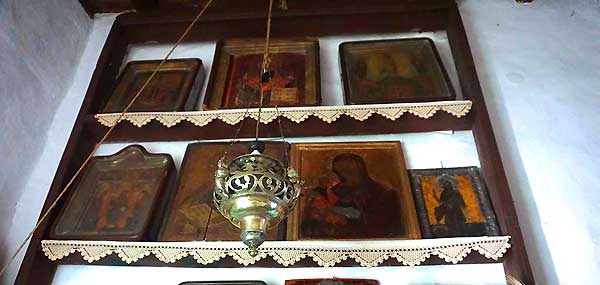 (Courtesy of Pew Research Center)
(Courtesy of Pew Research Center)
Only 5 percent of Greeks do not have even a single icon of a Saint in their home. A Gallop poll by Pew Research Center – which is acknowledged as the most reliable source on matters of religion – has shown that in a total of 18 countries, 95 percent of Greeks have icons of Saints in their homes.
Among the countries of the European Union, Greece has first place, along with its Romanian friends. Of the countries outside the E.U., Greeks are surpassed only by the Moldovans and the Georgians, with 97 and 96 percent respectively. Yet another find has shown that more than any other people, Greeks – with a total 59 percent – replied that religion is a very important part of their lives; this find was followed by the Orthodox of Rumania (50 percent), of Bosnia (46 percent) and of Serbia (34 percent).
Pew’s latest finds are totally aligned with the Center’s previous research (in 2017), which showed that Greece is by far the first country in which the national identity is linked to the prevailing faith. 54 percent of Greeks link their Hellenicity to Orthodoxy. On the basis of age groups, 39 percent of Greeks between the ages of 18 to 34 regard Orthodoxy as a basic element of national identity, while the percentage for the 35-to-49 age group reaches 49 percent, and 65 percent for people over the age of 50. The same replies were given by 40 percent of those who declared themselves to be left-wing.
The link between Hellenicity and Orthodoxy is explained to a significant degree by the role of Orthodoxy in the development of the Hellenic State. Characteristically, the Hellenic language was preserved to a large degree thanks to Orthodoxy and its liturgical texts. As for the possession of icons of saints by the overwhelming majority of Greeks, it is considered to be an indicator that people pray individually-privately far more than they do publicly, or, that they keep icons, for… their fear of God.
However, those who are puzzled by the large percentage of religiosity among Greeks tend to incorrectly interpret the disapproval by many, on the matter of practices by certain representatives of the Church; it is actually the role of the Church in the political life of the land that bothers them. The State should seal off its true function, by interpreting the Greek citizens’ views politically and not party-mindedly. But there is also the divisive, populist role of the Mass Media, which most certainly do not help towards providing sober approaches.
Translation by A.N.
Δεν υπάρχουν σχόλια:
Δημοσίευση σχολίου